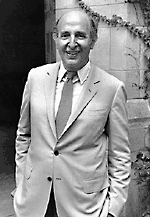 Talk
surrounding Ravelstein (Viking), the latest novel
by Nobel
laureate and former Committee on Social Thought professor Saul
Bellow, X'39,
has quickly
turned from its strengths and weaknesses as a work of fiction
to its merits as a work of fact.
Talk
surrounding Ravelstein (Viking), the latest novel
by Nobel
laureate and former Committee on Social Thought professor Saul
Bellow, X'39,
has quickly
turned from its strengths and weaknesses as a work of fiction
to its merits as a work of fact.
 |
| Bloom's
day in
the news, again. |
In the
novel, Chick--the story's narrator, presumed to be Bellow--reflects
on the last years of the title character's life. Ravelstein
is based in part on Allan Bloom, PhB'49, AM'53, PhD'55, Bellow's
longtime friend and U of C colleague who wrote the 1987 best-selling
cultural critique The Closing of the American Mind ("On
the Shelf," April/00).
Tongues
have been wagging because Bellow portrays Ravelstein as a gay
man who dies from AIDS-related complications, while in real
life Bloom never publicly disclosed whether he was gay, and
his official cause of death was reported as a peptic ulcer and
liver failure. "This is table talk," U of C English professor
Richard Stern told the April 30 Chicago Tribune."We all
love gossip."
In the
April 16 New York Times Magazine, writer D. T. Max explained
how the discrepancies have led to charges that Bellow unfairly
"outed" Bloom and left a false impression of his death. Max
quoted Nathan Tarcov, Bloom's medical executor and a professor
in the Committee on Social Thought, the political-science department,
and the College: "The word AIDS was never mentioned when Allan
died. I think I would have known." Max also relayed Bloom companion
Michael Wu's comments on the book: "It's fiction, not a biography."
Bellow,
who has since stopped publicly discussing the matter, told Max
he didn't really know if Bloom had died of AIDS: "It was just
my impression that he may have." The point of giving Ravelstein
the disease, Bellow continued, "was that here was a man who
had everything in life but also had the knife to the throat.
It's the tragic inevitability of the whole thing."
Chicago
Tribune cultural critic Julia Keller detailed the controversy
in an April 30 story, cheekily headlined "Between the covers,
Bellow sparks firestorm." She rehashed the debate, eliciting
the same denial from Tarcov and noting that it may be impossible
to ever know if Bloom had AIDS because death certificates aren't
public in Illinois and don't always indicate the disease.
The Ravelstein
grapevine keeps growing. In an April 22 New York Times
editorial, Brent Staples, AM'76, PhD'82, drew parallels between
the character Rakhmiel Kogon--described as having "tyranny baked
into his face"--and the late Edward Shils, X'37, a Committee
on Social Thought colleague with whom Bellow had a falling out.
On a more positive note, James Wood wrote in the April 15 Guardian
that Ravelstein "pays a fine tribute" to Janis Freedman,
AM'90, PhD'92, the Bloom graduate student who's now married
to Bellow and who served as the model for Chick's devoted wife,
Rosamund.
Reviewers
have generally praised Ravelstein as Bellow's return,
in his mid-80s, to the original, deeply felt characterizations
and descriptions of his earlier fiction. And the hubbub has
kept the book moving off shelves: Keller reported that more
copies--53--were sold in its initial week of release at 57th
Street Books than any other hardback work of fiction in the
store's history.--C.S.

![]()
 Talk
surrounding Ravelstein (Viking), the latest novel
by Nobel
laureate and former Committee on Social Thought professor Saul
Bellow, X'39,
has quickly
turned from its strengths and weaknesses as a work of fiction
to its merits as a work of fact.
Talk
surrounding Ravelstein (Viking), the latest novel
by Nobel
laureate and former Committee on Social Thought professor Saul
Bellow, X'39,
has quickly
turned from its strengths and weaknesses as a work of fiction
to its merits as a work of fact. 